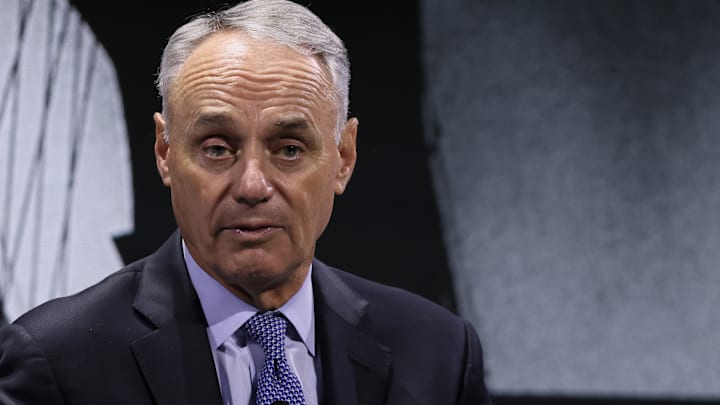MLB's current collective bargaining agreement is set to expire in the winter of 2026, and when it does, Rob Manfred has been telling anyone who will listen that he wants the league to implement a salary cap. The commission has been banging this drum for a while now, even going around and speaking to players on all 30 teams directly to try and whip up support. But it doesn't seem to be going all that well, at least if the players' union is to be believed.
Bruce Meyer, Tony Clark's right-hand man at the MLBPA, appeared on "Foul Territory" this week to offer an update on where negotiations stand ahead of next December's deadline, and he seemed just about fed up with how Manfred has been conducting himself.
“It’s kind of continuation of a pattern which has gone on for decades, which is, the other side … tries to go directly to players, tries to create divisions between players,” Meyer said. "The pitch is like, ‘Hey, this is really good for the players. One of the things players immediately seize on is, ‘Well, if this is so good for us, then why are they pushing it so hard? Why do they want it so desperately?"
On the one hand, you can sort of understand where Manfred is coming from here. Baseball remains the only major North American sport without a salary cap, and the gap between the league's rich and its poor has never been wider. But players and their union are right to be skeptical here: Dig a little deeper, and it's clear that what Manfred actually wants is to make life easier for the worst, most craven portion of his ownership, and he doesn't care if he has to shut down the sport to get it.
For more news and rumors, check out MLB Insider Robert Murray’s work on The Baseball Insiders podcast, subscribe to The Moonshot, our weekly MLB newsletter, and join the discord to get the inside scoop during the MLB season.
A salary cap isn't the fix Rob Manfred thinks it is
Sure, a salary cap would make it easier for smaller markets to compete with the Los Angeles Dodgers, New York Yankees and New York Mets. And sure, in a perfect world, that would help every fan base feel more invested in the product on the field on a yearly basis. But what's actually broken in baseball right now goes far beyond what a salary cap can actually fix.
The NFL and NBA have salary caps, but they also have a far more even revenue split between teams and players; whereas those leagues are 50-50 or even 51-49, MLB consistently comes in at around 55-45 in favor of ownership. And those leagues also, most critically, have salary floors: The NFL, for instance, requires teams to use at least 90 percent of their cap space over a given four-year period.
That sure feels like it would be a deal-breaker for the likes of the Pittsburgh Pirates and the Miami Marlins. Just hypothetically, if MLB instituted a $200 million salary cap tomorrow, would that be a magic wand that will convince Bob Nutting to spend an average of $180 million per year over four years? For context, Pittsburgh hasn't cracked $180 million over the last two years combined.
Even if the players wanted to leave money on the table and operate in good faith here, there's no reason to think that ownership, or at least a portion of it, will take them up on it and meet them halfway for the good of the game. And that, rather than the Dodgers or Yankees or Steve Cohen, is Manfred's real problem.
Rob Manfred is letting MLB's worst owners take the sport hostage
Baseball doesn't have a revenue problem, or a salary cap problem. It has, first and foremost, a Nutting problem: For all that might need to be changed about the league's television structure, it's awfully hard to build a functional and healthy sport when a not-insignificant portion of your 30 teams are essentially rent-seeking, content to cash checks from their appreciating asset while maybe gesturing vaguely in the direction of competing on the field.
Manfred can foment division among the players all he wants, and he can make all sorts of promises about how much better things would be if the media rights ecosystem were overhauled and players were given something closer to a 50-50 revenue split. There's an element of truth to all of that. But the fly in the ointment is that the owners will still be the owners: They don't want to create a more competitive environment, because that would mean they'd actually have to try and, you know, compete.
The reality is that Nutting would much rather maintain plausible deniability, pointing to the sky-high spending of those around him in order to excuse his own frugality. The MLBPA's lower and middle classes might be better off in Manfred's hypothetical world, but that world is a pipe dream.
